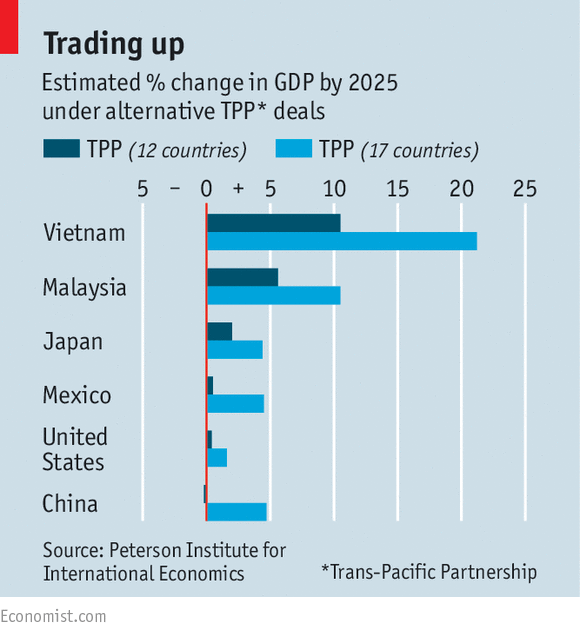Amidst news of the prolonged worldwide recession, new air strikes, secession attempts, and climate change, international trade — which in 2008 went through its largest crisis in history — has been mostly out of the public eye. Yet we’ve been told not to fear: the World Trade Organization, the foremost global body for promoting multilateral trade, remains watchful, and is optimistic that efforts for liberalization will bear fruit in the near future.
Sadly, the WTO’s hopes aren’t justified: the Doha Round of trade negotiations began in 2001, and even after thirteen years, success is nowhere in sight.
Seeking to address the liberalization concerns of WTO’s less-developed members, the Doha Development Round was supposed to culminate in 2005 with a new trade agreement. The envisioned deal concerned the reduction of trade barriers in commodities and services, as well as a new international framework for intellectual property rights. But soon after negotiations began, governments from developing countries — India, Brazil, China, and South Africa — and NGOs (non-governmental organization) began to worry that international negotiations were an obstacle to the governmental protection of developing sectors and regulation of financial services. After the failure of the Cancún proceedings in 2004, trade scholars worried that Doha might not be completed by its original deadline, but kept the hope that negotiations would continue. However, trade talks came to a deadlock in 2006, 2009, and 2011, mainly due to differences in agricultural policies. The US and the EU even backed out of previous agreements to reduce export support and agricultural subsidies, arguing that they did not want to weaken their bargaining positions too early in the Round.
Attempts to reconcile disagreements among countries since then have been largely in vain. But in December 2013, new tailwinds seemed to push the Doha Round to more favorable shores. The Bali Ministerial Conference, which concluded with the signing of a package deal on trade customs collection and a post-Bali development agenda, was touted to have “achieved what many believed was impossible”: bringing together the 160 WTO members for the first time in twelve years. But even though the Bali package does not have much to do with free trade — it facilitates the collection, but not the reduction, of custom duties — the agreement still wasn’t signed by all members in July 2014. This time, India vetoed the ratification to gain more bargaining power for Prime Minister Modi’s program of domestic food subsidies. Reuters reported that “trade diplomats in Geneva have said they are ‘flabbergasted,’ ‘astonished,’ and ‘dismayed,’ and described India’s position as ‘hostage-taking’ and ‘suicidal’.”
Perhaps commentators would have been less surprised if they had identified the negotiation deadlock as only the symptom of a more pervasive underlying cause: the national — read: political — interest of all countries at the negotiations table. The bread and butter of WTO member states is the extent to which they can encroach upon private enterprise, and control both product and financial markets. Under these circumstances, committing to open one’s borders to international trade is simply idle talk. Free exchange and competition would undermine the leverage of domestic interest groups, and cut through the structure of government intervention.
As Ludwig von Mises wrote to Friedrich Hoenig, one of his correspondents, in 1951:
U.S. representatives occasionally indulge in talk of free trade. This is pure illusion. American agricultural policies — parity prices, subsidies, limitation of crop surfaces … would collapse overnight if foreign imports were freely allowed into the country. Can you imagine a present-day England or present-day France with a regime of free trade? The more a country proceeds toward comprehensive control of all business activities, the more it must close itself to foreign countries.
Anyone reading modern day trade agreements would not be surprised to discover that they focus less and less on reducing import duties, and more on developing national industries, promoting exports, and ensuring domestic policy space. Their true purpose, a position of middle-of-the-road protectionism, is concealed under vague terms such as ‘freer, fair trade’, ‘gradual liberalization,’ ‘reciprocal concessions,’ or ‘development packages.’ However, the benefits of international trade do not lie in moderation and degree of reciprocity. True free trade is a policy of no trade barriers, to be pursued unilaterally by each and every country. If markets were released from the heavy hand of governments, international free trade would follow at one stroke.
The inherent incompatibility between free trade and increasing domestic government control will thus continue to hinder the dreams of WTO supporters, and the more distant ideal of free trade. Sadly, the golden days of Richard Cobden — who together with Michel Chevalier managed to sway the British Parliament and the French Emperor away from spending money on armaments and toward a free trade agreement — are long lost. All that is needed for flourishing international trade is a sound monetary system and the freedom of private enterprise. However, in a world where states have open-ended budgets for military campaigns and total control over the money supply, the bureaucratic structure in Geneva will only serve political interests.


